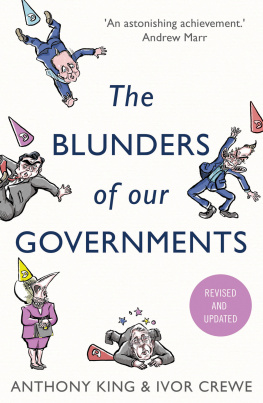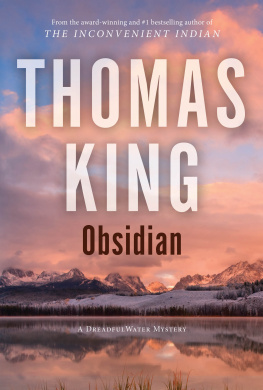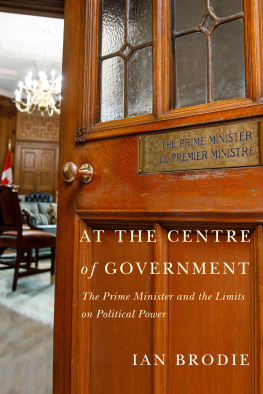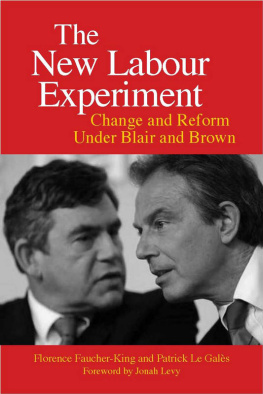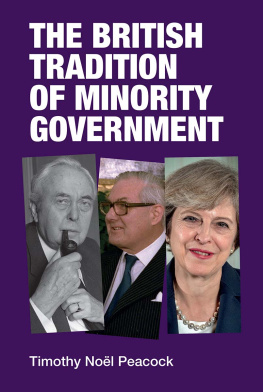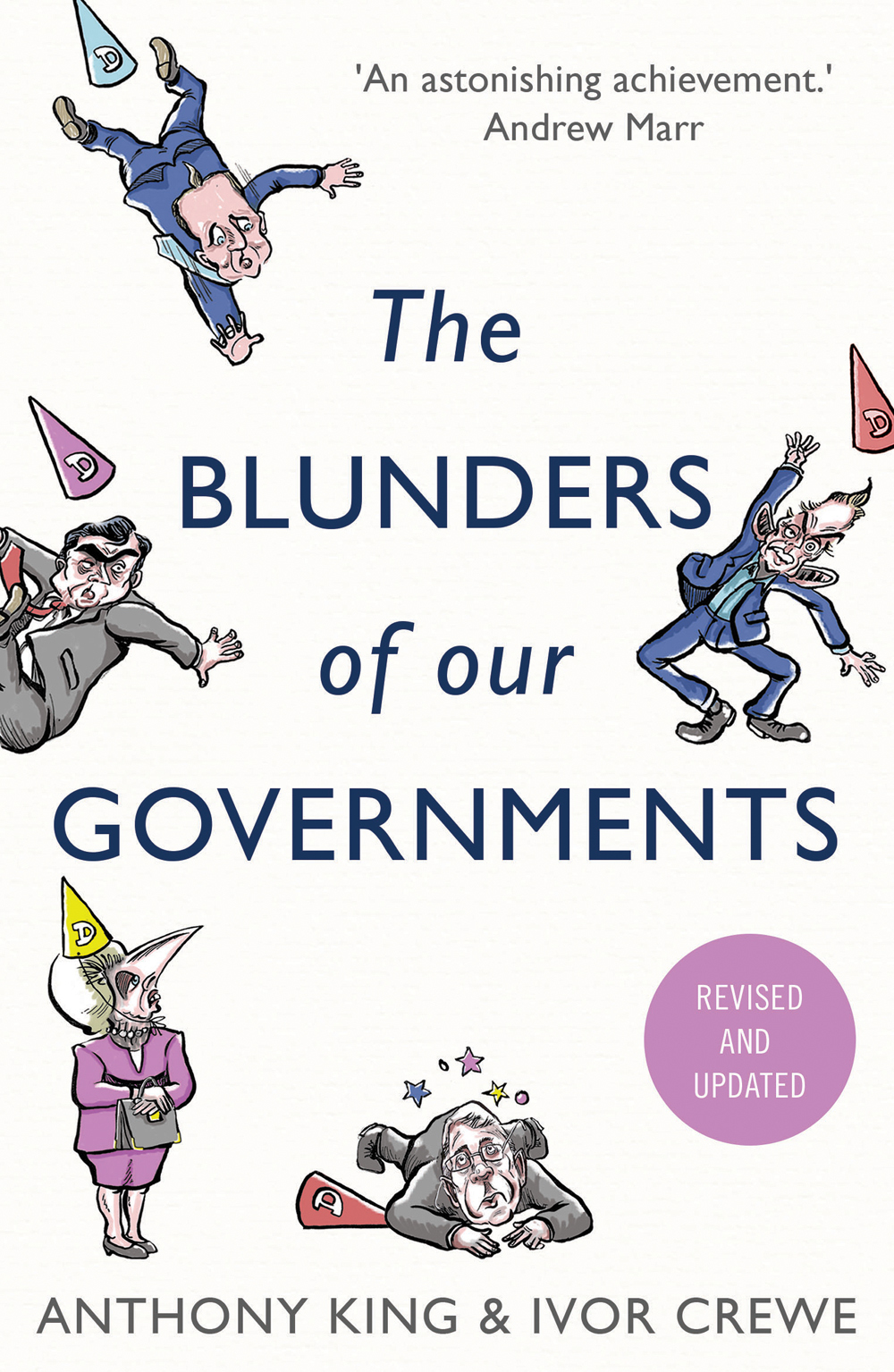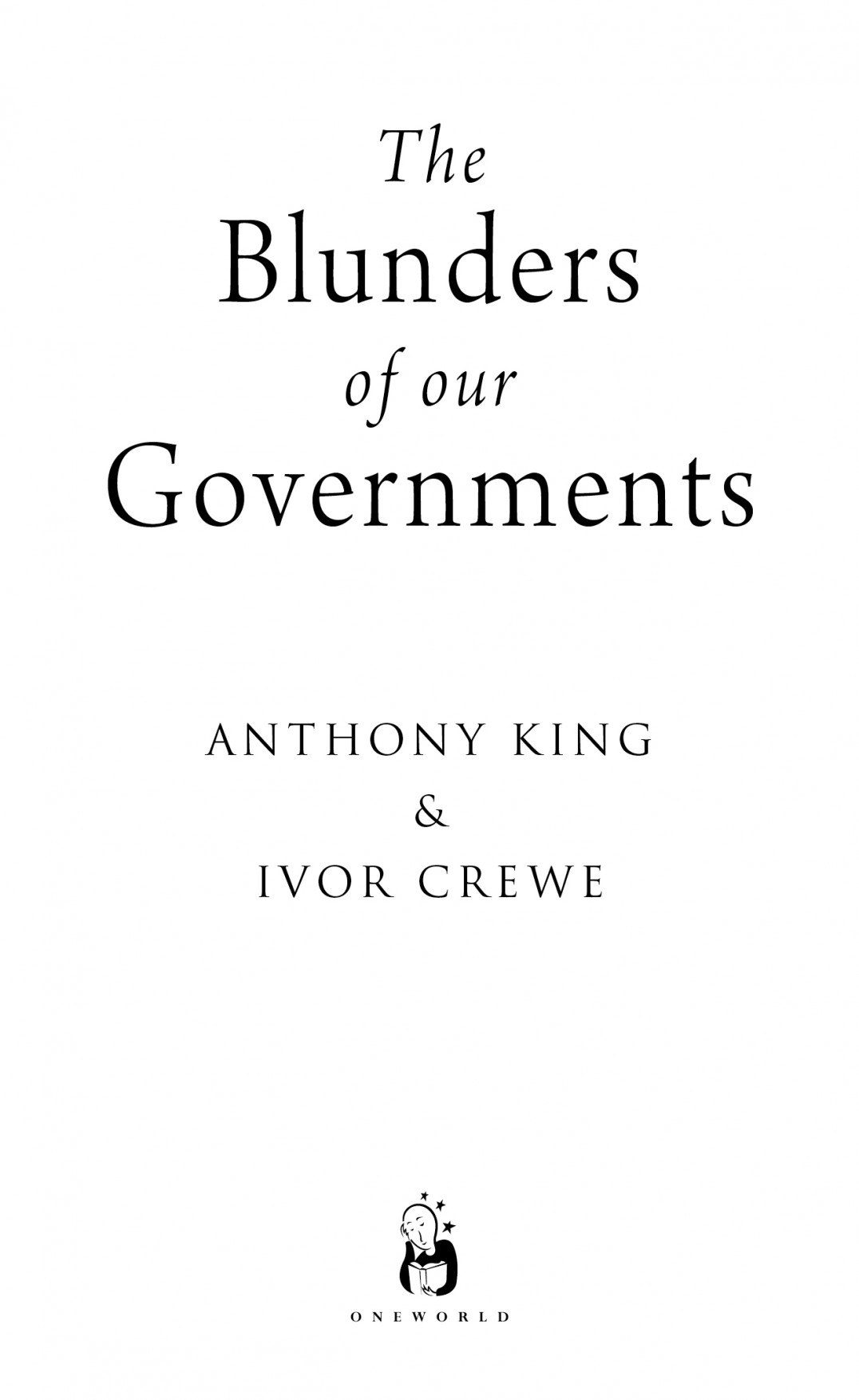PRAISE FOR
The Blunders of Our Goverments
A powerful new book.
DOMINIC SANDBROOK , Daily Mail
Excellent This book is essential reading.
ALISTAIR DARLING ,
Chancellor of the Exchequer 20072010
Grimly entertaining King and Crewe, veteran and incisive commentators, shatter the delusions This book should be a compulsory text for every would-be minister and permanent secretary.
Financial Times
A valuable guide from two well-qualified observers to the pitfalls of politics. Will it help new generations to avoid them? Dont invest your money on it!
LORD MICHAEL HESELTINE ,
Conservative cabinet minister 197983 and 199097
In a refreshing break from the customary finger-pointing tribalism of British politics, Anthony King and Ivor Crewe lay bare the ways in which governments of all hues have wasted mountains of cash on titanically misconceived projects in the past few decades astonishing.
Metro
Governments dont usually set out to do wrong. They just do it by mistake. This excellent guide to past cock-ups in policymaking and implementation should be required reading for every aspiring minister and civil servant.
JONATHAN POWELL , Chief of Staff to Tony Blair 19952007
If Britains politicians are among the worlds most honest, hardworking and well-meaning, why do they mess up so badly and so often? A trenchant book that will make you see red, even as you laugh.
Economist Best Books of 2013
Hugely enjoyable a truly shocking cautionary tale.
BARONESS SHIRLEY WILLIAMS,
leading Liberal Democrat and former Labour cabinet minister
Compelling David Cameron is said to have read about Winston Churchills early warmongering during his summer holidays. It would have been much better for all of us if he had read this.
Independent on Sunday
Anthony King and Ivor Crewe apply their lengthy experience not only to highlighting common patterns in the blunders of recent Governments but also, more important, to suggesting remedies. Anyone aspiring to be a minister should read, reflect and not repeat.
PETER RIDDELL , Director, Institute for Government
Illuminating and disturbing.
PHILIP JOHNSTON , Telegraph
A timely and compelling analysis of why we have been so badly governed for the last thirty years.
JOHN CAMPBELL,
author of The Iron Lady: Margaret Thatcher
Must be read by every incumbent and wannabe representative of the people.
The Herald Best Books of 2013
Timely and intelligent.
Prospect
Fascinating.
ALAN JOHNSON MP , New Statesman
This is a very apposite book and should be read by ministers, shadow ministers, parliamentarians and civil servants.
Total Politics
One of the hottest books of the season a deeply depressing catalogue of major projects championed at the highest level that have turned into turkeys.
Scotsman
A compelling read.
Chartist
ABOUT THE AUTHORS
Anthony King is Millennium Professor of British Government at the University of Essex. He broadcasts frequently on politics and elections for the BBC and writes on the same subjects for the Financial Times , the Daily Mail , the Daily Telegraph and the Observer .
Sir Ivor Crewe is the Master of University College, Oxford. He was formerly Professor of Government and Vice Chancellor at the University of Essex.
A Oneworld Book
First published in Great Britain and the Commonwealth
in 2013 by Oneworld Publications
This eBook edition published by Oneworld Publications in 2014
Copyright Anthony King and Ivor Crewe 2013, 2014
The moral right of Anthony King and Ivor Crewe to be identified as the Authors of this work has been asserted by them in accordance with the Copyright, Designs and Patents Act 1988
All rights reserved
Copyright under Berne Convention
A CIP record for this title is available from the British Library
ISBN 978-1-78074-405-6
eISBN 978-1-78074-618-0
Typesetting and eBook design by Tetragon, London
Cover illustrations by Matthew Buck at Hack Cartoons
www.mattbuckhackcartoons.com
Oneworld Publications
10 Bloomsbury Street, London WC1B 3SR
To our colleagues over many years in the Department of Government at the University of Essex
Introduction
Our subject in this book is the numerous blunders that have been committed by British governments of all parties in recent decades. We believe there have been far too many of them and that most, perhaps all, of them could have been avoided. In previous generations, foreign observers of British politics viewed the British political system with something like awe. Government in Britain was not only highly democratic: it was also astonishingly competent. It combined effectiveness with efficiency. British governments, unlike the governments of so many other countries, knew what they wanted to do and almost invariably succeeded in doing it. Textbooks in other countries were full of praise, and foreign political leaders often expressed regret that their own system of government could not be modelled on Britains. Sadly, the British system is no longer held up as a model, and we suspect one reason is that todays British governments screw up so often.
They screw up more often than most people seem to realise. Our strong impression is that, while a majority of Britons know about this, that or the other cock-up, they are by no means aware of the full range of them. Most readers of this book have probably never heard of let alone know much about a large proportion of the cock-ups we describe in later chapters. Typically, people hear about one blunder, then another, then another, without realising that there are far too many of them to be accounted for by random one-off sets of circumstances and that they may instead have common origins. If major car crashes occur continually at the same road junction, it may be that the fault lies not primarily with the individual drivers involved in the crashes, but with the design and designers of the junction. In our view, British governments in general are blunder-prone.
Are they more blunder-prone than they used to be? Are governments in Britain more blunder-prone than the governments of other, comparable liberal democracies? Both questions are pertinent, but, alas, we are not in a position to answer either of them. It has taken us the best part of four years to complete our investigations into latter-day UK blunders, and we have not had the time or resources to compare systematically either the most recent decades with previous decades, or Britains experience with that of other countries. We hope others will be tempted to undertake both tasks. It is certainly the case that British governments in the more distant past blundered from time to time, and we cite several postwar examples in Chapter 3. It is also the case that the governments of other countries are perfectly capable of blundering (as, for example, when Helmut Kohls German government agreed in 1990 to exchange West German Deutschmarks on a par with hopelessly overvalued East German Ostmarks, or when a majority of European Union countries foolishly agreed to allow Greece to enter the eurozone). But, whatever Britains past experience and whatever the experience of other countries, our central point remains the same: that modern governments in Britain blunder too often.

